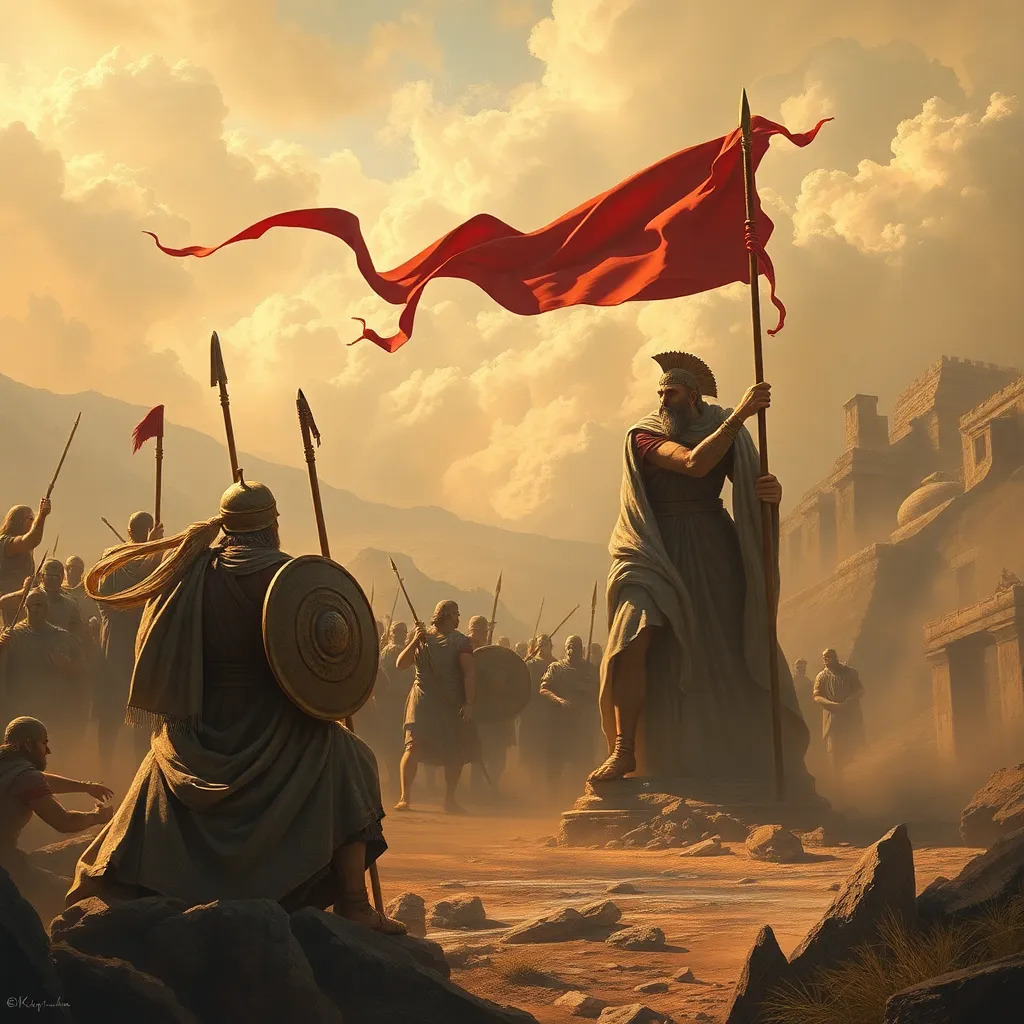Ares and the Tragedy of War: Lessons from Greek Myths
I. Introduction
Ares, the Greek god of war, embodies the chaotic and violent nature of conflict. Unlike his counterparts, Ares is often depicted not just as a warrior, but as a symbol of the darker aspects of battle, including destruction and bloodshed. His character serves as a potent reminder of the complexities of human behavior and the consequences of our actions in times of war.
Greek mythology, with its rich tapestry of stories and characters, provides profound insights into the human condition. Through the narratives surrounding Ares, we can explore essential lessons about war, power, and the human experience. This article aims to delve into these lessons, offering a deeper understanding of Ares and the tragic realities of war as depicted in Greek myths.
II. The Character of Ares: Symbolism and Attributes
Ares is often portrayed as a fierce and aggressive deity, representing the tumultuous nature of conflict. His personality can be characterized by several key attributes:
- Brutality: Ares revels in the violence of battle, often embodying the chaos and destruction that war brings.
- Passion: His fervent nature reflects the intense emotions that accompany warfare, including rage and hatred.
- Isolation: Ares is often shunned by both gods and mortals, illustrating the alienation that can accompany a life devoted to war.
The duality of war is central to Ares’ narrative—while he symbolizes glory and honor in battle, he also represents the devastating consequences of violence. This duality is evident in his relationships with other deities, such as his tumultuous affair with Aphrodite, the goddess of love. Their union highlights the stark contrast between love and war, further emphasizing the complexities of Ares’ character.
III. Myths Involving Ares: Key Stories and Themes
Several myths involving Ares illustrate the themes of war, love, and the consequences of conflict:
- Ares and the Trojan War: Ares played a significant role in the Trojan War, where he sided with the Trojans. His involvement exemplifies the concept of divine intervention in human affairs, showcasing how the gods influenced the outcomes of battles and the fates of heroes.
- The Myth of Ares and Aphrodite: Their love affair, which produced several children, contrasts the destruction of war with the beauty of love. This relationship raises questions about the coexistence of love and violence in human life.
- The Consequences of Ares’ Actions: Many myths highlight the disastrous outcomes of Ares’ influence, from the loss of lives to the suffering brought on by his relentless pursuit of conflict.
IV. The Tragedy of War: Insights from Greek Myths
Greek myths present a haunting reflection on the tragedy of war, emphasizing several key insights:
- Human Suffering: The tales surrounding Ares often depict the immense suffering and loss caused by war, reminding us of the human cost of conflict.
- Futility of War: Myths illustrate the cyclical nature of warfare, where victories are often temporary and lead to further violence and retribution.
- Moral Lessons: Ares serves as a cautionary figure, emphasizing the dangers of unchecked aggression and the moral complexities of war.
V. Lessons on Leadership and Power from Ares’ Myths
The narratives surrounding Ares offer valuable lessons on leadership and the exercise of power:
- Impact of Leadership Decisions: Ares’ influence on wars underscores the importance of strategic decision-making in the face of conflict.
- Dangers of Ambition: The stories of Ares warn against the perils of pride and unbridled ambition, showcasing how these traits can lead to ruin.
- Ares as a Cautionary Figure: Modern leaders can learn from Ares’ mistakes, recognizing the importance of humility and the need for a balanced approach to power.
VI. The Role of Fate and Free Will in War Narratives
Greek mythology intricately weaves the concepts of fate and free will within its war narratives:
- Destiny vs. Choice: The interplay between destined events and individual choices is a recurring theme, illustrating how heroes navigate their fates amidst the chaos of war.
- Unpredictability of War: Myths highlight the unpredictable nature of conflict, where even the mightiest can fall to unforeseen circumstances.
- Ares’ Influence: Ares’ interventions often shape the destinies of heroes and nations, raising questions about the extent of divine influence in human affairs.
VII. Modern Reflections: Ares in Contemporary Society
The lessons from Ares and Greek mythology remain relevant today:
- Relevance in Modern Conflicts: The themes of Ares’ narratives resonate with contemporary conflicts, where the consequences of war continue to impact lives globally.
- War in Media: Ares’ representation in popular culture often glorifies violence, prompting a critical examination of how society portrays war.
- Moving Beyond Violence: There is a growing call to reflect on the implications of conflict and seek resolutions that prioritize peace over aggression.
VIII. Conclusion
The tales of Ares and the tragedies of war captured in Greek myths offer timeless lessons about human behavior, leadership, and the moral consequences of conflict. As we reflect on these narratives, we are reminded of the ongoing relevance of Ares’ teachings in understanding the complexities of war and violence in our own lives. It encourages us to seek a deeper understanding of conflict, urging us to consider the lessons of the past as we navigate the challenges of the present.




